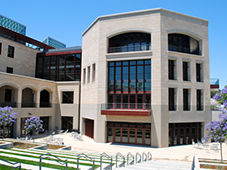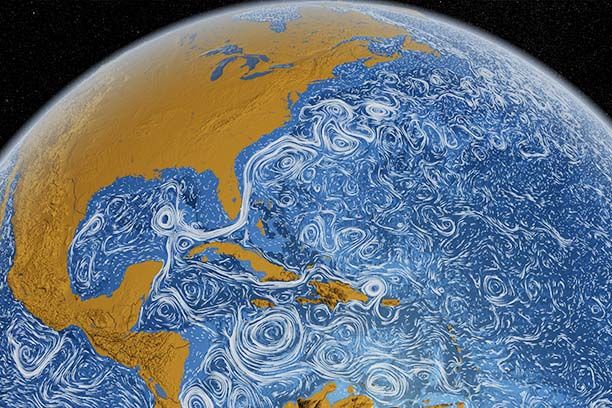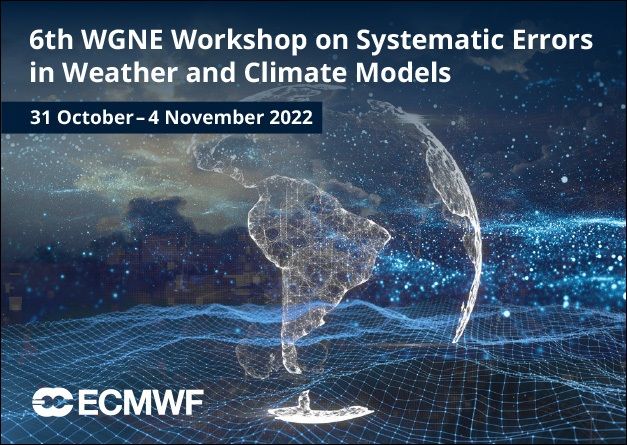Climate models have been a central tool to understand the Earth’s climate since the late 1960s. The past couple of decades have seen significant developments in the level of complexity and capability to make projections on increasingly fine scales. Over the same time, Earth-observing systems experienced a revolution in the number and quality of observations acquired to monitor the Earth. The measurement of new parameters as well as the improved spatial and temporal resolution of observations opened up new opportunities to understand the evolution of the Earth System.
It has increasingly become clear that the better integration of observations and models in coupled systems is critical for many aspects of the development and application of climate models, including their initialization, calibration and evaluation. In order to be used for societal application and developing climate services, model predictions and projections must be confronted with observation data for a better understanding of the climate system. And it is imperative that this is done across the timescales from subseasonal to interdecadal and beyond, and across spatial scales of relevance to society, from cities to planetary scales.
To coordinate this integration, WCRP has recently approved the creation of a new Core Project, the Earth System Modelling and Observations (ESMO).
What is ESMO?
The Earth System Modelling and Observations (ESMO) is a new Core Project of WCRP, which will coordinate, within WCRP, the integration of model-data-observation across Earth system components, fundamental and applied disciplines, time and spatial scales, and infrastructures. This will be done in very close collaboration with all the other WCRP Core Projects and Lighthouse Activities. This approach will enable the co-development of WCRP modelling and observational requirements to observe, understand, and predict the climate system.
ESMO will also work closely with the Global Climate Observation System (GCOS) to ensure WCRP's observational requirements are communicated to the GCOS panels and help to fill observational gaps identified by GCOS. The organization of these activities will require strong support from a dedicated international project office. Currently, WCRP has an open call for proposals for institutions around the world that may have an interest in hosting such a project office.
Modelling activities in ESMO
ESMO is involved in the organization, or co-sponsoring, of a number of workshops that will shape the future of climate modelling by recognizing key topics for further development. Outcomes of these workshops will also be essential to identify priorities so WCRP can address future needs and co-develop products to serve society in a changing climate. Below is a list of these workshops and how to get involved.
 The main goal of the workshop will be to identify the key contemporary challenges for climate modelling and to plot a course forward from present practices that will allow us to rise to major new challenges for climate research by exploring opportunities for climate modelling that exist now and into the coming decades. This workshop will be held virtually and participation is by invitation only. Some sessions may be broadcasted live via Youtube. More details are available online.
The main goal of the workshop will be to identify the key contemporary challenges for climate modelling and to plot a course forward from present practices that will allow us to rise to major new challenges for climate research by exploring opportunities for climate modelling that exist now and into the coming decades. This workshop will be held virtually and participation is by invitation only. Some sessions may be broadcasted live via Youtube. More details are available online. The modeling landscape has evolved considerably in recent years. The Second Model Hierarchies workshop will discuss the design and use of modeling hierarchies in all aspects of Earth system science, covering the major climate system components -- atmosphere, ocean, land, cryosphere, biosphere –and also underline the interest in exploring the ways in which such models are connected to the downstream uses of this data in the study of climate impacts. Registrations are open with a deadline for abstract submission and financial support application on 30 April 2022.
The modeling landscape has evolved considerably in recent years. The Second Model Hierarchies workshop will discuss the design and use of modeling hierarchies in all aspects of Earth system science, covering the major climate system components -- atmosphere, ocean, land, cryosphere, biosphere –and also underline the interest in exploring the ways in which such models are connected to the downstream uses of this data in the study of climate impacts. Registrations are open with a deadline for abstract submission and financial support application on 30 April 2022. The WCRP Digital Earths Lighthouse Activity and ESMO Core Project are jointly convening a workshop to bring together all relevant communities interested in ultra-high-resolution modelling to share results of current efforts and discuss the road ahead for km-scale coupled climate modelling at both global and regional scales with an initial focus on the physical climate system. The intended outcomes include the establishment of a global research network with expertise in ultra-high-resolution (kilometer-scale or finer) global and regional Earth system modelling including its individual components. The workshop is planned to be in person at the National Center for Atmospheric Research (NCAR) in Boulder, CO, USA, public health regulations permitting. More information and an expression of interest can be found on the workshop webpage.
The WCRP Digital Earths Lighthouse Activity and ESMO Core Project are jointly convening a workshop to bring together all relevant communities interested in ultra-high-resolution modelling to share results of current efforts and discuss the road ahead for km-scale coupled climate modelling at both global and regional scales with an initial focus on the physical climate system. The intended outcomes include the establishment of a global research network with expertise in ultra-high-resolution (kilometer-scale or finer) global and regional Earth system modelling including its individual components. The workshop is planned to be in person at the National Center for Atmospheric Research (NCAR) in Boulder, CO, USA, public health regulations permitting. More information and an expression of interest can be found on the workshop webpage. The WCRP Working Group on Numerical Experimentation (WGNE) is organizing the “6th WGNE workshop on systematic errors in weather and climate models”, in a hybrid format, that will bring together a wide range of experts on simulating the Earth System including atmosphere, ocean, waves, land-surface, atmospheric composition, and associated disciplines to advance the understanding of systematic simulation errors at all timescales. A particular emphasis is given to identifying errors in complex coupled systems and to understand their root causes. Early career researchers from selected countries will be able to enter a competition for the best abstracts for oral presentations. The World Meteorological Organization (WMO) is pleased to offer funding for travel to ECMWF (UK) to the winners of the competition. Abstracts must be submitted by the 31 May 2022 deadline.
The WCRP Working Group on Numerical Experimentation (WGNE) is organizing the “6th WGNE workshop on systematic errors in weather and climate models”, in a hybrid format, that will bring together a wide range of experts on simulating the Earth System including atmosphere, ocean, waves, land-surface, atmospheric composition, and associated disciplines to advance the understanding of systematic simulation errors at all timescales. A particular emphasis is given to identifying errors in complex coupled systems and to understand their root causes. Early career researchers from selected countries will be able to enter a competition for the best abstracts for oral presentations. The World Meteorological Organization (WMO) is pleased to offer funding for travel to ECMWF (UK) to the winners of the competition. Abstracts must be submitted by the 31 May 2022 deadline.IMAGES: futuristic server room, Istock: 1310178117; Venue - Stanford University, see workshop website; Perpetual ocean, NASA; advertisement from the 6th WGNE workshop on systematic errors in weather and climate models, see the workshop website.

